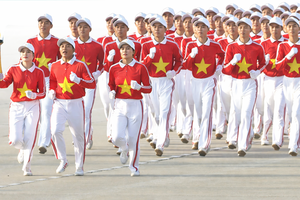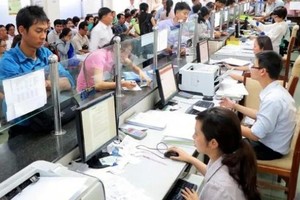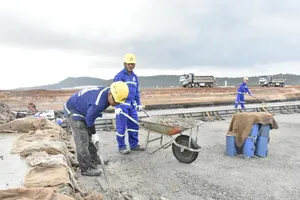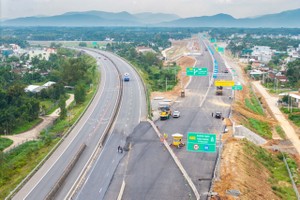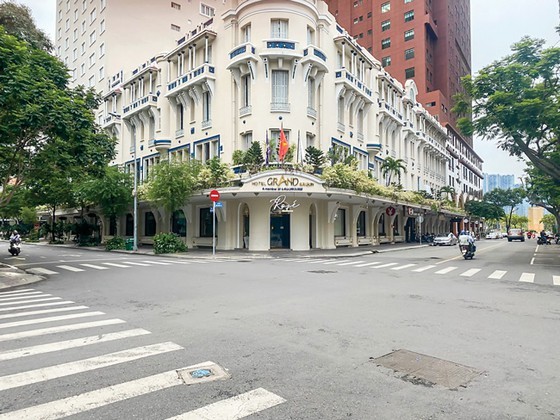
Illustrative photo.
However, future measures to help people and businesses are unclear. When India implemented social distancing, the international media reported that people were adversely affected. The question now is on how Vietnam plans to live with the Covid-19 pandemic situation for a long period of time.
Vaccine is key
Many scientists and experts in the medical field have strongly recommended adapting to living with the Covid-19 pandemic situation. However, this can only be possible when a majority of the population has been vaccinated and a threshold of community immunity has been reached. In recent months, developed countries have stepped up on vaccination drives. Singapore and Australia now already have a clearer roadmap to survive and live with the Covid-19 situation.
The difficulty for Vietnam today is lack of better access to the vaccine. In the early stages of the pandemic in the beginning of 2020, effective preventive anti-pandemic measures made us complacent towards prioritizing the importance of the vaccine. The Ministry of Health was slow in reaching out to vaccine producers, far slower than many other countries.
The current amount of vaccines that Vietnam receives are mainly from the COVAX program and the relatively large amount of aid from some countries such as Japan and the United States. Over the last few months, Vietnam has tried diplomacy to improve its vaccine strategy, by reaching out to suppliers and governments of developed countries that have excess vaccine supply, and who could possibly help Vietnam. There has also been a strong move by Vietnam to involve in vaccine production technology to ensure a long-term source of vaccine in the country.
The latest data shows that only 4% of the population, or about 3.9 million people in Vietnam, have completed their first dose of the vaccine, while the number of people who have completed their second dose is only 0.2%. Vietnam's goal is to get 150 million doses of the vaccine, enough for 70% of the population, but current agreements are set at only 105 million doses. However, more important is the time to receive this vaccine and deploy it on a larger scale for all the people.
Social distancing vital
When the rate and number of new infections are predicted to increase beyond the capacity of the health system, there is no other way but to strictly follow social distancing rules. The health system, even in rich and developed countries, does not have enough Intensive Care Unit (ICU) beds to accommodate a sudden increase in the number of patients. Maybe many people don't realize it, but an ICU in France comes with a private room and at least five medical staff. The equipment within an ICU is complicated and not everyone knows how to use all these complicated devices. Therefore, there is no other way than to adopt to maximum social distancing measures. At the same time, with the implementation of social distancing, it is necessary to take into account its consequences and look for more functional solutions.
Currently, it cannot be estimated how much economic damage will occur as a result of implementation of social distancing every single day that passes in Ho Chi Minh City. This loss will affect the lives of many persons, families, and businesses. When France implemented social distancing for two months, it was estimated that the damage during that time was EUR 120 bn, about EUR 2 bn per day. Britain's social distancing in 2020 also averaged about EUR 800 mn per day. In Australia it was about EUR 63 mn per day, in New South Wales about EUR 90 mn per day, and in Malaysia about EUR 150 mn per day.
Perhaps the Ho Chi Minh City government also has a plan to provide support in dire situations on an urgent priority basis. On social network sites we have seen volunteer groups helping in many difficult situations. The spirit of love and compassion in these difficult times has also reawakened in the Vietnamese people.
Even as social distancing is implemented, the reorganization of daily life and essential business and production activities also need to be maintained. The first is to ensure that the circulation and distribution of food is kept to a minimum by ensuring supply, prioritizing home delivery, or ordering in advance to be delivered later. Agencies or businesses also need to maintain a minimum number of employees for important work to be done. Take a simple example such as those who work with paperwork, who can't work online, and have to go to the office to complete their shift, and have to also ensure social distancing among a number of people present at the office. Manufacturing plants can still be maintained if the pandemic prevention measures are strictly followed.
Another important issue that has received little attention in Vietnam is that of mental health. Social distancing on a weekly basis will negatively affect the psychology of people living in big cities because of narrow spaces and lack of greenery. In developed countries, after a period of separation, people have seen an increase in domestic violence, and the psychology of both adults and children is negatively affected. Some countries have education and propaganda programs specifically for children to help them better understand Covid-19, without causing fear or negative emotions.
The implementing of Directive 16 by Ho Chi Minh City authorities at this time is absolutely necessary. It is hoped that the City will quickly recover back to normal and soon stabilize the reorganization of essential services and goods. The relaxation of social distancing can only be done on the strength of the health system, while waiting for the vaccine supply. The budget needs to adjust to overspending in times like this, and if it has to be advanced for the future, this is also perfectly acceptable.


